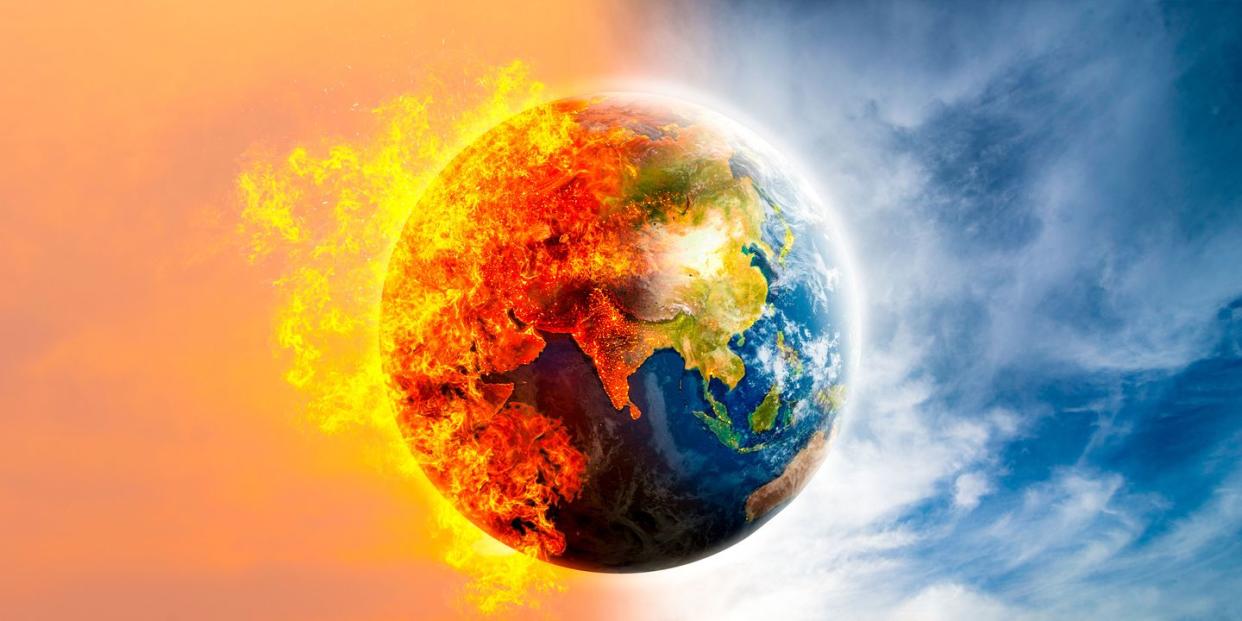Congrats, July 2023! You Were the Hottest Month in 120,000 Damn Years

July 2023 will obliterate the record for hottest recorded month, upping the record by potentially 2.7 degrees Fahrenheit.
Scientists dip back into the historical record to attempt to quantify just how hot July is, saying it could be the hottest in 120,000 years.
The United Nations warns that the records are just starting to roll in as heat increases.
July 2023 sits poised to break global heat records. And we’re not just talking about eking out a minuscule tenth of a degree here or there, but a solid crushing of the hottest month ever recorded globally by as much as 2.7 degrees Fahrenheit. It was hotter last month than anything we’ve seen in the last 80 or so years, according to a report from the United Nations’ World Meteorological Organization and the European Commission’s Copernicus Climate Change Service.
But scientists don’t think it stops there. Though records on monthly heat data have only been kept for about 100 years (depending on the location), some experts believe that the record-breaking July will become the hottest month in the last 120,000 years.
The 80-year mark, we can track. The 120,000-year mark is, well, a bit harder to nail down. Without records, researchers are forced to turn to what are called “proxy records”—things like ocean sediments, coral reefs, and air trapped in polar ice cores—to investigate the temperatures of the more distant past.
Now, these methods can’t give us temperature data down to the month, so it’s a bit hard to make a “hottest month on record” claim over that much of history. But some scientists are nonetheless convinced that this July takes the cake. “These are the hottest temperatures in human history,” Samantha Burgess, deputy director at Copernicus, says in a report, according to CNN.
University of Leipzig’s Karsten Haustein believes that July could be the warmest month ever for global mean temperatures. “We may have to go back thousands, if not tens of thousands of years,” he says in a statement, “to find similarly warm conditions on our planet.”
Whether or not it really hasn’t been this hot for 120,000 years, there’s no arguing that July 2023 reached a global “boiling” point, as the UN puts it.
The first 23 days of July averaged 62.51 degrees around the world. The previous record was July 2019, which averaged 61.93 degrees globally. This year’s new record follows a record-breaking June and a record-breaking day—July 6, 2023, which had a global average temperature of 62.74 degrees.
If the trend upward continues, 2023 could turn into one of the hottest years on record, the UN claims. “This anomaly is so large with respect to other record-breaking months in our record that we are virtually certain that the month, the month as a whole, will become the warmest July on record, the warmest month on record, in all likelihood,” says Carlo Buentempo, director of Copernicus, in a news release before the month ended. “We can say that the first three weeks of July have been the warmest three-week period ever observed in our record.”
While certain regions around the world have around 150 years of data from which they can potentially pull local scorching records of their own, the July 2023 mark is a global record. The impacts are global, too. Whether you’re dealing with 30-plus days straight of 110 degrees in Phoenix, wildfire-inducing heat in southern Europe, ocean temperatures rising with the atmospheric heat off the coast of Florida, or crop-crushing warmth in Asia, the heatwave is here.
The UN says that climate change is to blame for this pattern of extreme heat. Sprinkle in a developing El Niño, and temperatures could grow even hotter next summer. In addition, according to the BBC, scientists say that other small natural occurrences could be playing a bit part in this year’s heat—things like a lower-than-normal release of Saharan dust that would normally reflect the sun’s energy back toward space, or the 2022 Tonga underwater volcano eruption adding water vapor to the atmosphere.
António Guterres, UN secretary general, says the shattering of records across the board signifies that global warming is no longer a strong enough term for what we’re experiencing. “The era,” he says, “of global boiling has arrived.”
You Might Also Like
